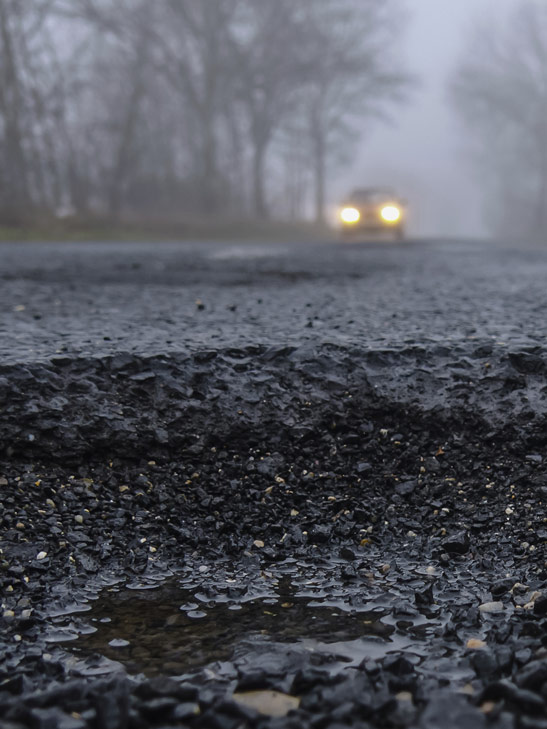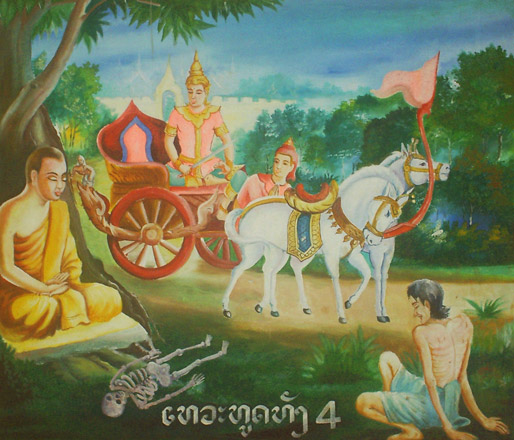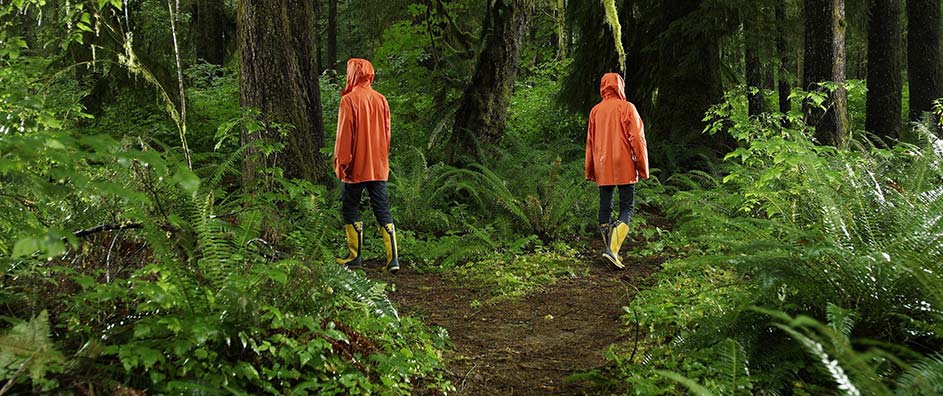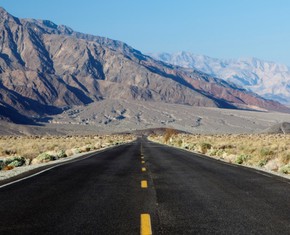The views expressed in our content reflect individual perspectives and do not represent the authoritative views of the Baha'i Faith.
A few years ago, while driving in the pouring rain, I swerved around a vicious-looking pothole only to drop a front wheel into the innocent-looking pothole next to it — which turned out to be the jagged tire-eating monster crater from your worst unplanned car-expense nightmare.
 It was definitely a learning experience. Disasters often fit that description, don’t they? So what did I learn? Well, in the material realm, I learned that you can’t see how deep or treacherous a pothole is when it’s filled with water. As a result of that harsh learning experience, I ruined a new tire, broke a wheel and did major damage to my car’s suspension, not to mention creating a deep pothole in my wallet. Ouch.
It was definitely a learning experience. Disasters often fit that description, don’t they? So what did I learn? Well, in the material realm, I learned that you can’t see how deep or treacherous a pothole is when it’s filled with water. As a result of that harsh learning experience, I ruined a new tire, broke a wheel and did major damage to my car’s suspension, not to mention creating a deep pothole in my wallet. Ouch.
And in the spiritual realm, where symbols and meaning both reside, I learned that if you’re setting out on the seeker’s path, you have to watch out for the metaphysical potholes — especially the ones that look like harmless puddles.
You’ve probably heard the old sayings before – there are no mistakes on the spiritual journey. No right and wrong turns, as one sage put it, only right and left turns. The spiritual journey is just a process of learning, right? Just a lifelong educational experience where we grow from our tests?
Well, yes, true enough. Every spiritual path has its share of symbolic potholes, the tests and trials of life we each have to undergo. They can be minor, or they can be deep and sharp and difficult. But don’t you wish you would’ve had a little friendly guidance for pain and suffering avoidance when you started out to search for meaning in this existence? I mean, wouldn’t it be nice to at least avoid the biggest and most painful potholes if you could?
Buddha said that life is suffering; that we cannot avoid it; that it has many lessons in detachment to teach us. No question that’s true, of course – but it’s most true of the suffering we make for ourselves. Does that sound familiar? We create the life circumstances that bring our suffering about; and then go through terrible self-induced pain – made even more terrible by the fact that we made it possible.
I know you’ve had this experience. We all have. It’s a human trait – as fallible beings, we create messes in our lives, and nobody but the one who made the mess can clean it up. Actions have consequences, my father used to tell me. He even had a favorite saying to illustrate that maxim: “You made your bed; now you sleep in it.” If I had a dollar for every time he said that, I could’ve paid for the pothole damage.
I tried, as I gradually absorbed that profound lesson, to make my bed properly – to minimize the mistakes I made. That didn’t always work. But it did have an interesting side-effect – I began to realize that some people seem to bring on their own suffering much more than others. I noticed that most when I began to work with drug addicts in a recovery program.

Prince Siddhartha (Buddha) witnessing suffering and death
Arguably, alcoholics and drug addicts (and alcohol is, after all, a drug, probably the most fearsome and fatal one of all) have a disease, a genetic pre-disposition to the substances that make their consistently self-destructive behaviors so potentially devastating and hard to treat.
But when you work with addicts in a treatment setting, you learn that some want to achieve sobriety and endeavor toward that goal of recovery with enormous commitment and drive; and others repeatedly relapse and fall off the wagon. Why? Part of it is motivation, of course. But many of the ones who relapsed, I noticed after several years of observation and experience, consistently put themselves in positions where their “triggers” could easily be actuated. They went to bars, hung out with the crowd they knew wanted to get high, and just repeatedly exposed themselves to life’s biggest and most treacherous potholes. The addicts who successfully recovered, on the other hand, built renewed lives away from their old crowds and trigger mechanisms, finding ways to make new friends and develop insightful and ultimately spiritual ways of recreating themselves.
And in the course of my work with addicts I realized that the same thing is true of any journey of self-discovery and exploration.
Anyway, I wanted to dedicate this little series of articles to helping others avoid all those self-inflicted problems, pains and perils. So here, in the spirit of service to humanity, for your delectation and perusal and hopefully your elucidation, are a few of the big ugly potholes I drove into that you maybe ought to try to avoid on your own spiritual path. When you’re exploring inner space; looking for your center and seeking truth, watch out for these common and oh-so-avoidable blunders, mistakes and wrong turns:
1. No one can give you a spiritual awakening.
Like most novice seekers, I started out believing that some people really had their spiritual life squared away. I met people who I really wanted to emulate. But it turns out that we’re all fighting the battle to become better, no matter the age or the mileage. No one is immune, and no one, regardless of their position or reputation or station in life, leads a perfectly spiritual existence. All of us have potholes behind us, and more ahead of us. Which means your spiritual awakening and growth is between you and God, not between you and someone else.
No one else can discover your inner truth. No human relationship can replace the spiritual relationship you build with the mystical reality. And no other person can ever walk the road of insight and inner searching life gives you:
…man should know his own self and recognize that which leadeth unto loftiness or lowliness, glory or abasement, wealth or poverty. The straight path is the one which guideth man to the dayspring of perception and to the dawning-place of true understanding and leadeth him to that which will redound to glory, honor and greatness.
We cherish the hope that through the loving-kindness of the All-Wise, the All-Knowing, obscuring dust may be dispelled and the power of perception enhanced, that the people may discover the purpose for which they have been called into being. – Baha’u’llah, Tablets of Baha’u’llah, p. 34.
You May Also Like
Comments

















and multiplicity of viewpoints, the notion that truth and reality are
perceived differently from diverse points of view, and that no single
point of view is the complete truth. http://en.wikipedia.org/wiki/Anekantavada
It takes a great deal of equanimity for believers ...in distinct faiths to look on truth this way and to not hold onto the delusion that their truth, their faith, is somehow superior to all others. For faiths which have spiritual station as central to their beliefs this becomes even more difficult. It becomes difficult to even be truly ecumenical because of tenants of faith which teach that all humanity must convert to that faith to be saved, to be enlightened, to come of age.